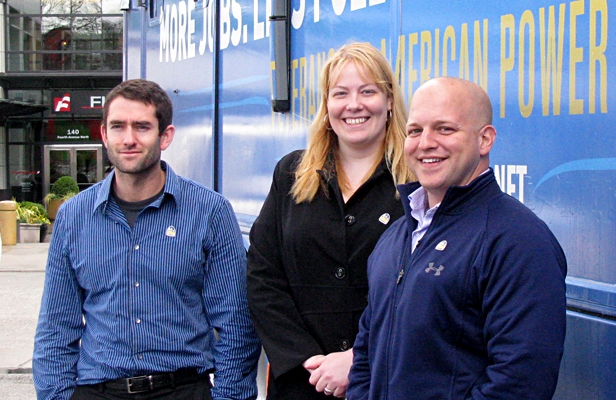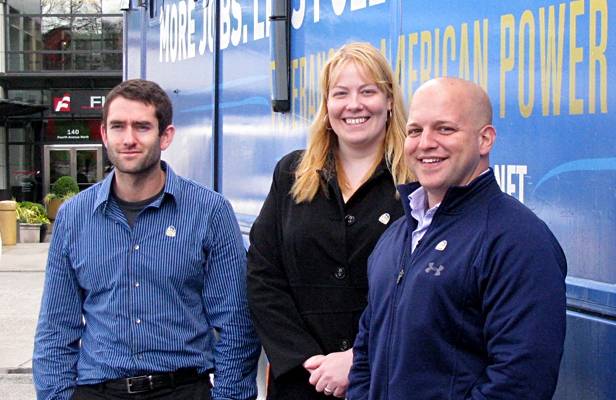 The Operation Free tour brought U.S. veterans Matt Victoriano (left), Robin Eckstein, and Patrick Bellon to Seattle last week to call for clean-energy legislation.Grist photo/Jonathan HiskesAs a tanker driver in Iraq, U.S. Army veteran Robin Eckstein saw firsthand the risk that fossil-fuel dependence posed to American troops. She drove a water truck in convoys with fuel tankers, and every trip outside the secure zone at Baghdad International Airport meant a potential meeting with sniper fire or improvised explosive devices.
The Operation Free tour brought U.S. veterans Matt Victoriano (left), Robin Eckstein, and Patrick Bellon to Seattle last week to call for clean-energy legislation.Grist photo/Jonathan HiskesAs a tanker driver in Iraq, U.S. Army veteran Robin Eckstein saw firsthand the risk that fossil-fuel dependence posed to American troops. She drove a water truck in convoys with fuel tankers, and every trip outside the secure zone at Baghdad International Airport meant a potential meeting with sniper fire or improvised explosive devices.
But field stations in the surrounding area depended on that fuel for their vehicles and equipment that ran off generators.
“It was a logistical nightmare that they have to wait for us, because, frankly, we were slow, we were poorly equipped, and we were trying to get through Baghdad to get to them,” said Eckstein, 33. “Otherwise they can’t operate.
“If they had solar panels to charge their laptops and other equipment, they wouldn’t need our slow-moving vehicles coming out to them. They would be more efficient. We would be putting less American lives at risk.”
Eckstein, who finished her service with the National Guard in 2007, has also come to see the larger threat that fossil fuels and climate change pose to the military. Climate change causes droughts and natural disasters around the world, which in turn drives instability, mass migrations, and conflict—and the U.S. military will increasingly be called on to respond.
The Pentagon agrees. The recently released Department of Defense Quadrennial Review, which assesses threats and priorities for the military, states: “Climate change will contribute to food and water scarcity, will increase the spread of disease, and may spur or exacerbate mass migration. While climate change alone does not cause conflict, it may act as an accelerant of instability or conflict, placing a burden to respond on civilian institutions and militaries around the world.”
Says Eckstein, “As long as the U.S. military is the 911 for the world, every time there’s a natural disaster, we are going to be there. Unfortunately, climate disruption just speeds that up.”
Ultimately, promoting national security means doing something about climate change, Eckstein argues. That’s why she joined up with Operation Free, a coalition of veterans that’s traveling the country in support of a national clean-energy bill.
Eckstein is currently on her second multi-state trip with Operation Free, which is organized by the Truman National Security Project and other progressive veterans’ groups. The warm responses the first time around convinced her to do it again.
“Normally people see [climate] as a left issue, but it’s a bipartisan issue,” she said. “Everyone wants our nation to be secure. The fact that they’re willing to listen to us as veterans, and that they understand it, they get it, makes me very hopeful we’re going to be able to make this change and take back our energy future.”
Eckstein says the Pentagon already gets it and has plans to increase fuel efficiency and use more rechargeable energy devices in combat zones. Now the rest of the country needs to get it too: Supporting the troops means consuming less oil.
“It’s hard to find an issue in the United States that has such an impact on national security,” said Matt Victoriano, a former Marine who served in Iraq and another member of Operation Free. “It’s evident to everyone that our dependence on foreign oil is fueling terrorist insurgencies, and we’re paying for it through our military. We’re funding both sides of a war, which is pretty ridiculous.”
The U.S. spent $66 billion on oil from Saudi Arabia alone in 2008, he said. Saudi Arabia was the top source of funding for Al Qaeda and other extremist networks that year, according to the government’s top financial counter-terrorism official.
“There’s no positive outcome to continuing on our path,” said Patrick Bellon, an Army veteran on the tour. “So we can listen to old men who make a ton of money who are calculating that maybe they won’t be around when [oil] runs out. Or we can look out for the next generation. That’s the only question in my mind.”


